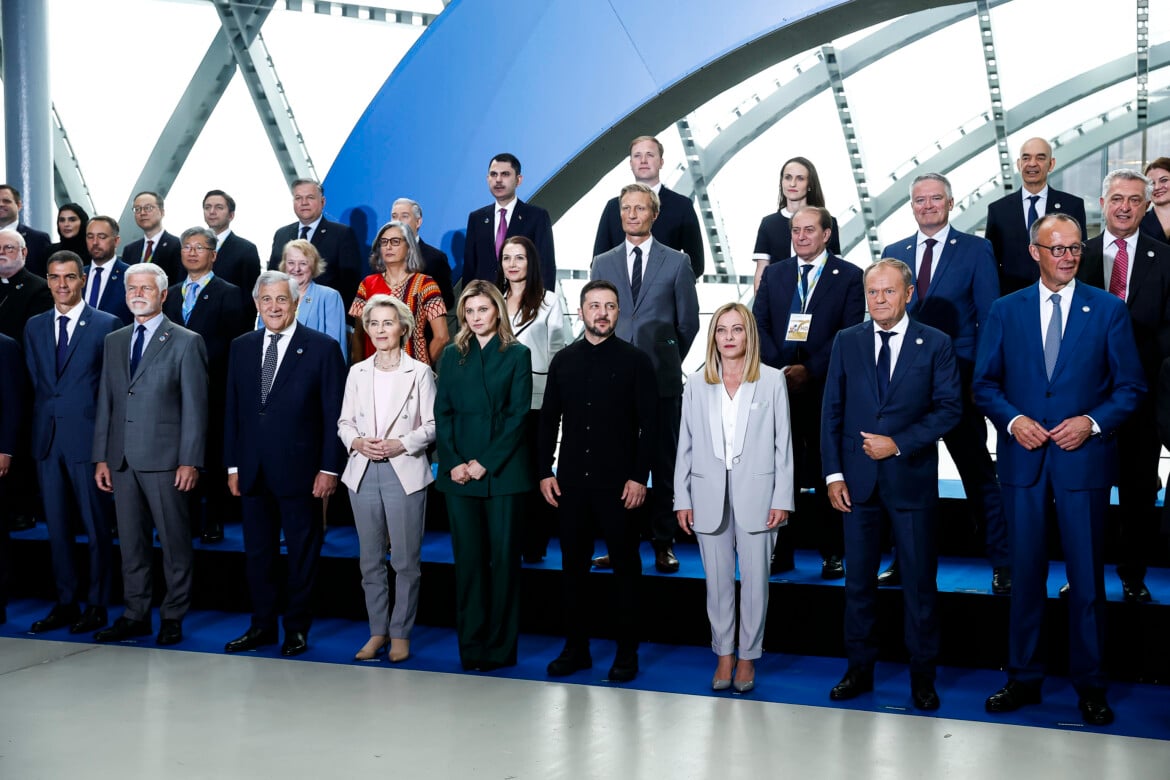Analysis
Europe’s cracks are showing under the promises of a premature ‘Marshall Plan’
Leaders reeled off six-figure pledges for humanitarian aid and infrastructure reconstruction projects, but at the same time they made no secret of the fact that all this is intertwined with the development of defense and the military sector.

At the opening of the Ukraine Recovery Conference, the impression was that every European and U.S. speaker addressed the room while really speaking to voters back home. All repeated the same core message: we will stand by Kyiv “to the very end,” and, thanks to that unity, the country can be lifted from wartime ruin – and even more, could achieve an “economic and social miracle.”
Marshall Plan parallels came thick and fast, perhaps betraying the hope nurtured by European chancelleries that post-war reconstruction would also deliver an ideological refoundation of the continent. Those references were voiced first of all by President Volodymyr Zelensky, greeted with prolonged applause, and then by White House special envoy Keith Kellogg, who even likened the task ahead to post-war Afghanistan and Iraq.
But beneath that pageant of cohesion (peppered with lofty historical parallels) different interpretations and diverge points could be glimpsed, mirroring each country’s hesitations. For Estonian Prime Minister Kristen Michal, the goal to be pursued must be “a definitive victory” over Russia; “there is no Plan B,” he warned. Others preferred less clear-cut formulas that have been overused to the point of sounding almost empty: a “fair cease-fire” (Greek prime minister Kyriakos Mitsotakis), “peace through multilateralism” (Spain’s Pedro Sánchez), or backing Kyiv “until Vladimir Putin can be brought to the negotiating table” (German chancellor Friedrich Merz).
It was Merz who raised the issue of internal divisions within the European coalition, chiding Slovakia for blocking the 18th sanctions package against Moscow, still awaiting approval. Moments later he pleaded with Washington – “Stay with us … stay with the Europeans,” he implored, in an attempt to ingratiate himself with the unpredictable US leadership. This drew an equally sugary reply from Kellogg, whose presence Giorgia Meloni trumpeted throughout the day: “Wir sind hier” (“We are here with you”), the envoy affirmed, switchin briefly to German. Yet the meaning of that pledge is doubtful when, some 6,000 kilometers from Rome, U.S. secretary of state Marco Rubio is conferring with Russian foreign minister Sergei Lavrov. Looking beyond the daily reversals, it becomes clear that on Ukraine the White House is running its own experiment, using the crisis as a “test bed” to redesign its relations with the rest of the world.
The U.S. envoy was clear that reconstruction, in his view, offered the chance to pilot “a new type of governance” and “a new model of capitalism,” rebuilt on ESG (environment, social and governance) pillars. On this, everyone nodded: public money alone will never suffice, so Kyiv must lure private capital – what Italian Finance Minister Giorgetti called “a balanced mix of multilateral and bilateral partnerships.” Ukraine’s economy minister Yuliia Svyrydenko promised “large-scale privatization” to speed the country’s integration into the European Union.
But here is where more ambiguity arises: leaders reeled off six-figure pledges for humanitarian aid and infrastructure reconstruction projects, but at the same time they made no secret of the fact that all this is intertwined with the development of defense and the military sector, now identified as the main driver of industrial growth for the continent. But in what political direction?
Some of those present timidly tried to mention the “rule of law” as a compass that should guide the massive investments; others, in perfect harmony with the “Cold War” atmosphere that pervaded many of the speeches, resurrected the concept of a “free world” to be protected against external threats. On the other hand, the much-evoked Marshall Plan came on the ruins of a conflict that had already ended, while Thursday’s recovery blueprint was being drawn up even as Moscow launched its fiercest missile strikes since the invasion began.
Most likely, Zelensky, though physically in Rome, had his focus more on London, where the self-styled Coalition of the Willing convened to promise concrete moves to “secure” Ukraine’s skies.
Originally published at https://ilmanifesto.it/le-crepe-delleuropa-sotto-le-promesse-del-piano-marshall on 2025-07-11
